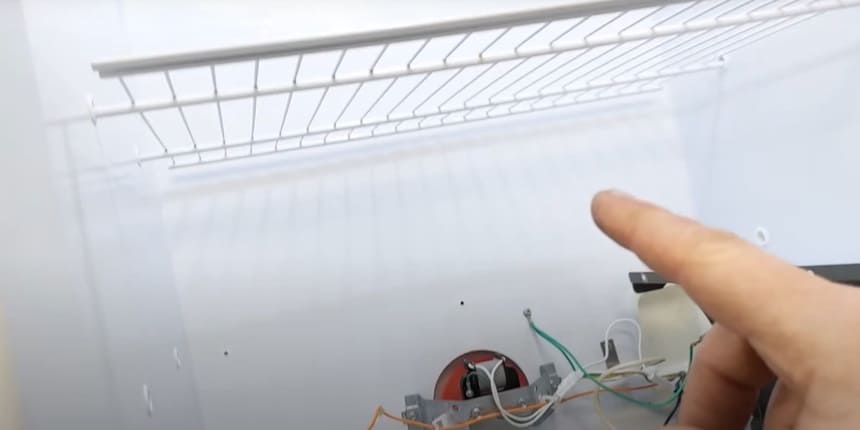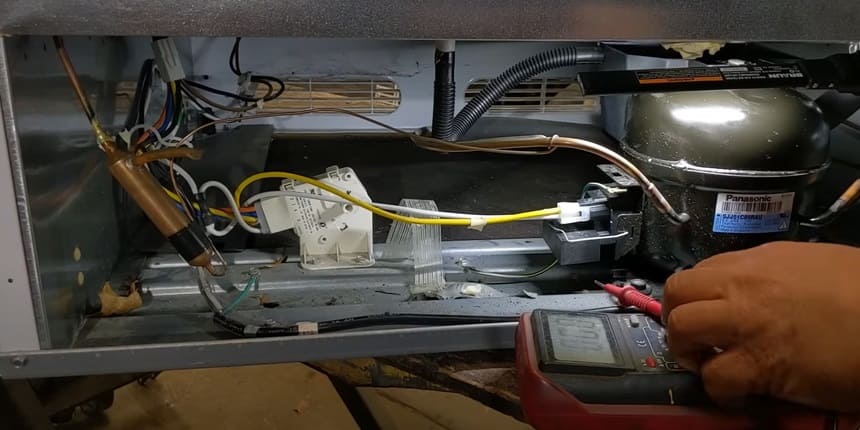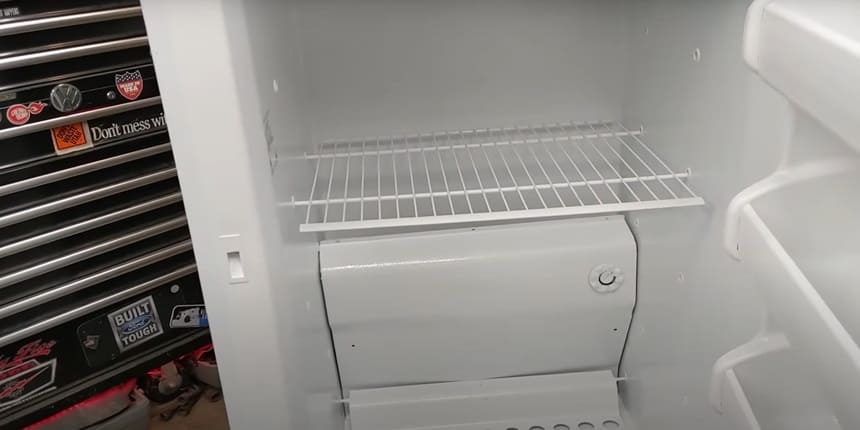The freezer may stop working in cold weather due to the accumulation of frost on the evaporator coils, which can restrict airflow and affect the cooling process. This can be exacerbated if the freezer is located in an unheated area or if the temperature drops too low, causing the unit to struggle to maintain the desired temperature.
When temperatures drop, especially in unheated spaces, the freezer may struggle to maintain its operating temperature. Frost can accumulate on the evaporator coils, leading to restricted airflow and hindering the cooling process. Additionally, the compressor may struggle to operate in excessively cold conditions, leading to a malfunction of the freezer.
As a result, it’s important to consider the location and ambient temperature when installing a freezer to ensure optimal performance, especially in cold weather.

Why Freezer Stop Working in Cold Weather – Freezer Malfunctions In Winter
Understanding the mechanics behind freezer operation:
Freezers rely on a thermostat to regulate temperature. When external temperatures plummet, the thermostat may struggle to maintain the set temperature.
The role of external temperatures on freezer efficiency:
Subzero external temperatures can make the freezer’s compressor run less frequently, causing the temperature to rise. On the other hand, extremely cold conditions can cause the freezer to overwork, leading to a shutdown.
How cold weather can cause freezers to stop working:
In frigid conditions, moisture can seep into the freezer’s electronics, leading to malfunctions. Additionally, if the freezer contains food, its internal temperature can drop, triggering the thermostat to stop the compressor, resulting in a perceived malfunction.
Troubleshooting Tips: Freezers And Cold Weather
When cold weather hits, your freezer may suddenly stop working and leave you with a defrosted mess. To avoid expensive repairs or replacements, it’s essential to identify the signs of a malfunctioning freezer and perform quick checks before diving into troubleshooting.
Common signs of freezer failure in winter include frost buildup, fluctuating temperatures, and items not freezing properly. Begin by checking the power source, temperature settings, and door seals to rule out simple issues. If these checks don’t solve the problem, it’s time to assess the compressor, defrost timer, and thermostat.
| Quick Checks | Deep Troubleshooting |
|---|---|
| Verify power source and connections | Assess compressor and fan functionality |
| Inspect the temperature settings | Check defrost timer and thermostat |
| Examine door seals for damage | Ensure proper ventilation around the freezer |
Common Culprits Of Winter Freezer Woes – freezer not getting cold enough
#1: Thermostat settings:
Incorrect thermostat settings could cause the freezer to stop working in cold weather. If the thermostat malfunctions, it may not regulate the temperature properly, leading to freezer issues.
#2: Defrost system problems:

In cold weather, the defrost system may struggle to function efficiently, resulting in ice buildup that affects the freezer’s performance. Regular maintenance of the defrost system is crucial to prevent such issues.
#3: Insulation and environmental factors:
Inadequate insulation or exposure to extreme cold temperatures can impact the freezer’s ability to maintain optimal conditions. Proper insulation and consideration of environmental factors are essential to prevent winter freezer problems.
#4: Refrigerant flow disruptions:
In colder weather, the refrigerant flow may be affected, potentially leading to the freezer not working correctly. Ensuring proper refrigerant levels and addressing any disruptions is key to maintaining freezer functionality in cold conditions.
Reviving Your Freezer During Cold Spells – freezer running but not freezing
During cold weather, freezers may stop working due to various reasons. One way to improve performance is by adjusting the thermostat to maintain the optimal temperature.
Additionally, adequate insulation can help retain heat within the freezer, preventing it from malfunctioning. Another area to consider is refrigerant-related problems, which can be resolved by seeking professional assistance.
What Should I Do If My Freezer Stops in Winter?
Continuous maintenance of freezers is crucial, particularly during cold weather. Be sure to check the seals and gaskets for any wear and tear to prevent loss of cold air and reduce strain on the freezer’s compressor.
Additionally, regularly defrosting the freezer can maintain its efficiency. Checking the freezer’s location for proper ventilation and insulation can also help ensure its continuous operation.
It’s important to know when to seek professional help to address any issues that may be beyond DIY troubleshooting, thus ensuring the reliable performance of the freezer.

Diy Fixes Vs. Professional Help – why won’t my freezer freeze
When your freezer stops working in cold weather, it can be a frustrating experience, but there are simple repairs you can try at home.
- Check the power source to ensure it’s connected and functioning properly.
- Inspect the thermostat to verify it’s set at the right temperature.
- Clear any ice build-up in the freezer that may be obstructing proper function.
However, if these DIY fixes don’t resolve the issue, it’s important to know when to call a professional. Signs such as unusual noises, constantly cycling on and off, or complete failure may indicate the need for expert help.
Professional repairs not only ensure long-lasting results, but also offer a warranty for the work performed. So, while DIY attempts are helpful, knowing when to seek professional help is crucial for maintaining the functionality of your freezer in cold weather.
Optimizing Freezer Location In Cold Weather
When the weather turns cold, it’s important to consider the impact on your freezer’s performance. Placing a freezer in a garage or unheated space can lead to issues, so it’s essential to choose an ideal location.
The surrounding temperature can greatly influence where your freezer should be placed, as extreme cold can disrupt its functionality. To optimize freezer performance in cold weather, consider relocating it to a more temperature-controlled area.
Ideal spots for your freezer during winter include a basement or a heated laundry room. By doing so, you can ensure that your freezer operates efficiently regardless of the outdoor temperature. Relocating your freezer to a more suitable location can significantly improve its performance during colder months.
Why Does My Freezer Stop Working In Cold Weather?
In extremely cold temperatures, the freezer may struggle to maintain the necessary temperature, causing it to stop working effectively.
Cold weather can affect the thermostat’s performance and cause the freezer to run more frequently, leading to overcooling and potential malfunctions.
How Does Cold Weather Impact Freezer Performance?
In cold weather, the surrounding temperature can influence the freezer’s ability to regulate its internal temperature.
The cold exterior can make the freezer work harder to maintain the set temperature, leading to increased energy consumption and potential malfunctions.
What Can I Do To Prevent Freezer Problems In Cold Weather?
To prevent freezer malfunctions in cold weather, ensure the freezer is located in a consistently insulated area.
Additionally, regularly checking the temperature settings and avoiding overstocking the freezer can help maintain optimal performance. Conducting routine maintenance and inspections is crucial for preventing potential issues during cold weather.
